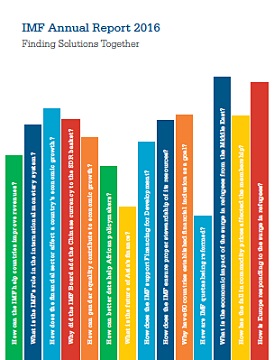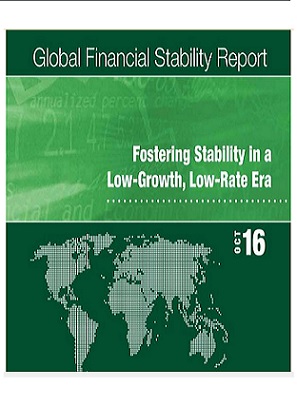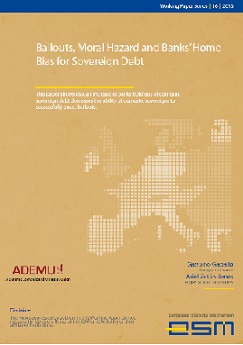Reis, Ricardo, (2016), “Fiscal crises as pretexts for quantitative easing”, VoxEu, 14 October Conventional economic theory predicts that, outside of a financial crisis, quantitative easing should have no effect on real outcomes or inflation. This column proposes two theoretical channels through which quantitative easing might also work in a fiscal crisis. In this case, quantitative easing can be a valuable tool because it can control the path of inflation over …Read More
Europe after Merkel
Mody, Ashoka, (2016), “Europe after Merkel”, Project Syndicate, 13 October Next year, Germany will hold a federal election, and the new Bundestag will choose the country’s next chancellor. Whether or not Angela Merkel retains the role – at the moment, things are not looking good for her or her Christian Democratic Union (CDU) – one thing is certain: Germany’s chancellor will no longer be de facto Chancellor of Europe. That will …Read More
International Monetary Fund Annual Report 2016
International Monetary Fund, (2016), “International Monetary Fund Annual Report 2016”, IMF, September The year was marked by difficult challenges and milestone achievements. To reinvigorate modest growth at a time of uncertainty about a complicated global economy, the IMF membership endorsed a three-pronged approach of monetary, fiscal, and structural policies to get the world economy back on a stronger and safer growth track. Highlights of the IMF’s work during the year …Read More
Global Financial Stability Report: Fostering Stability in a Low-Growth, Low-Rate Era
International Monetary Fund, (2016), “Global Financial Stability Report: Fostering Stability in a Low-Growth, Low-Rate Era”, IMF, October The current report finds that short-term risks to global financial stability have abated since April 2016. The rise of commodity prices from their lows, along with the ongoing adjustments in emerging markets, has supported a recovery in capital flows. In advanced economies, weaker growth has been mitigated by the prospect of further monetary …Read More
Stress testing the EU fiscal framework
Masten, Igor, Grdović Gnip, Ana, (2016), “Stress testing the EU fiscal framework”, VoxEU, 13 October Fiscal policies in European Economic and Monetary Union states are being reinforced. This column argues that the cyclically adjusted budget balance will be an imprecise tool for measuring fiscal discipline, and structural deficit rules limits are too stringent. If the official methodology is used to trigger corrective fiscal contractions, it may increase macroeconomic instability. Relevant Posts …Read More
Bailouts, Moral Hazard and Banks’ Home Bias for Sovereign Debt
Gaballo, Gaetano, Zetlin-Jones, Ariel, (2016), “Bailouts, Moral Hazard and Banks’ Home Bias for Sovereign Debt“, ESM Working Paper Series, July We show that an increase in banks’ holdings of domestic sovereign debt decreases the ability of domestic sovereigns to successfully enact bailouts. When sovereigns finance bailouts with newly issued debt and the price of sovereign debt is sensitive to unanticipated debt issues, then bailouts dilute the value of banks’ sovereign debt holdings rendering bailouts less …Read More
Fiscal decentralisation and income inequality
Stossberg, Sibylle, Bartolini, David, Blöchliger, Hansjörg, (2016), “Fiscal decentralisation and income inequality”, OECD Economics Department Working Papers No. 1331, 11 October This paper investigates the relationship between fiscal decentralisation and economy-wide disposable income inequality. Drawing on a dataset of up to 20 OECD countries over a period from 1996 to 2011, a regression analysis is performed, relating several indicators of national income inequality and a wide array of fiscal decentralisation indicators. …Read More
Hysteresis and fiscal policy during the Global Crisis
Fatás, Antonio, Summers, Lawrence, (2016), “Hysteresis and fiscal policy during the Global Crisis”, VoxEu, 12 October Conventional wisdom on supply and demand suggests that demand shocks are cyclical or transitory, and that only technology shocks are responsible for trend changes. This column argues that cyclical events can have permanent effects on demand, and therefore GDP. It is time for policymakers to start considering the possibility of hysteresis seriously. Relevant Posts Ubide, Ángel, …Read More
The case for an active fiscal policy
Ubide, Ángel, (2016), “The case for an active fiscal policy”, VoxEU, 11 Οctober The pre-crisis consensus was, and remains, very strong – the business cycle would be managed by monetary policy, while fiscal policy would focus solely on debt sustainability. In a world of zero interest rates, however, fiscal policy has to contribute to supporting aggregate demand and protecting against deflationary risks. This column outlines three ways in which a well-designed expansionary …Read More
Economic consequences of the 1953 London Debt Agreement
Galofré-Vilà, Gregori, McKee, Martin, Meissner, Christopher, David, David, (2016), “Economic consequences of the 1953 London Debt Agreement”, VoxEu, 9 October In 1953, the Western Allied powers approved the London Debt Agreement, a radical plan to eliminate half of Germany’s external debt and create generous repayment conditions for the remainder. Using new data from the historical monthly reports of the Deutsche Bundesbank, this column argues that the agreement spurred economic growth by …Read More







